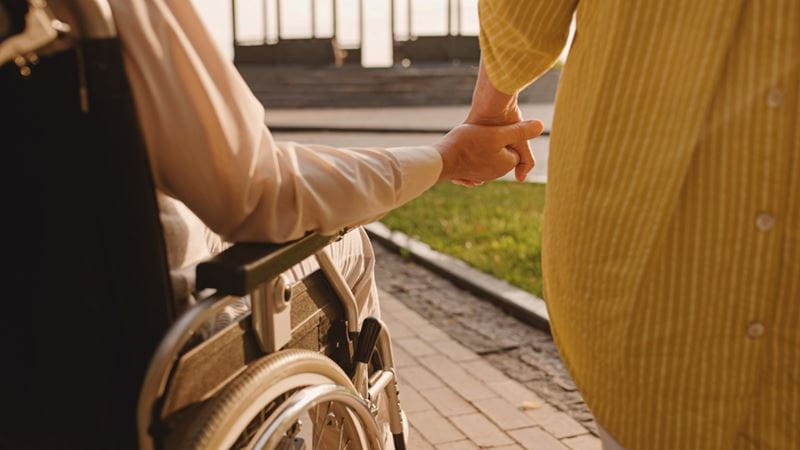
Are you providing hours of care each week for a partner, older child or parent? If so, you could be claiming Carer’s Allowance to give extra financial support.
There were 1.38 million people claiming Carer’s Allowance in the last year, government figures show. If you’re eligible and not claiming, you could well be missing out on thousands of pounds a year.
Even if you aren’t eligible for Carer’s Allowance, being a carer means you could get more in other benefits such as Universal Credit or Pension Credit.
So, if you are a carer in some way and are providing over 35 hours’ worth of care each week, it’s worth investigating whether you could claim.
However, the Carer’s Allowance system can be complex to navigate if you’re receiving other benefits or earning income from elsewhere, as you’re only allowed to earn up to £151 (after deductions) to qualify for the benefit.
If you go over the earnings limit by even £1, you could be hit with a sudden notice to pay back all your Carer’s Allowance during that period, as many have in the last year alone – potentially in the thousands of pounds.
With that in mind, it’s important to understand how Carer's Allowance works and when you’re eligible.
The main eligibility requirements for Carer’s Allowance are:
If you also receive the full State Pension, you aren’t able to claim, as you’d be receiving double benefits.
The full eligibility list can be found on gov.uk, including more details on what happens if you've moved here from the EU.
Carer’s Allowance is currently £81.90 a week, paid every four weeks, or you could receive it weekly in advance. You're eligible if you care for someone for at least 35 hours a week and they receive certain benefits such as Personal Independence Payment (PIP) or Attendance Allowance.
These caring responsibilities could include shopping, cooking, washing, taking them to doctors' appointments or helping with the management of bills.
You do not have to be related to the person you’re caring for, and you don’t need to live with them. However, you should tell the person before you claim as it could affect the amount they receive in other qualifying benefits, such as disability premiums.
If you live in Scotland and receive Carer Support Payment (equivalent to Carer’s Allowance), you may also get Carer’s Allowance Supplement. This is paid twice a year and the June payment in 2024 will be £288.60.
Income from occupational or personal pensions do not count as earnings, meaning you can be paid Carer’s Allowance in addition to these.
Carers UK, a national charity for unpaid carers, says this catches a lot of people out. People mistakenly think they can’t claim for Carer’s Allowance because they’re claiming a private or occupational pension, says Emily Holzhausen, Director of Policy and Public Affairs at Carers UK.
“When people hear the words ‘you can’t claim if you have a pension’ they might assume this includes occupational and personal pensions. But it is just the State Pension it affects. It may be a reason for some people not claiming, but there are a whole host of reasons.”
Carer’s Allowance is a taxable benefit, meaning if you receive above £12,570 a year, there may be income tax to pay on the allowance. More information on this can be found at the Low Incomes Tax Reform Group, including what to do if you’re not being taxed through PAYE.
If you’re under State Pension age and aren't eligible for Carer’s Allowance, you can still apply for Carer’s Credit.
Even though this won’t add anything to your bank balance, it will help plug gaps in your National Insurance record to protect your State Pension, potentially boosting the amount you’ll receive when you come to claim it.
The full State Pension is currently £221.20 a week and is therefore higher than the earnings cap to claim Carer’s Allowance – you cannot receive both at the same time.
However, if your State Pension is lower than the Carer’s Allowance rate, then the difference can be topped up. So, if you receive £66 State Pension a week, you can get £15.90 a week in Carer’s Allowance. The rules on this can be complicated, so it’s worth checking using one of the numbers at the bottom of this article.
If your State Pension is over the Carer’s Allowance amount, it may still be worth applying as you could get an “underlying entitlement” to Carer’s Allowance. This tells other departments that you are a carer and may be entitled to benefits such as increased Pension Credit.

If you’re making more than the £151-a-week earnings cap for Carer’s Allowance, you’ll no longer be eligible for the benefit and will be required to give back any payments made while earning this amount.
If you don’t notify the Department for Work and Pensions (DWP) when you go over this threshold, you can suddenly receive a notice of an overpayment – and some people aren’t being told of overpayments for several months or years, meaning they can owe thousands of pounds, with the money required to be repaid over time.
The problem is that, even though it’s their responsibility to notify of any changes to income, carers can sometimes struggle to recognise if they've gone over the earnings limit.
Carers UK’s Holzhausen said in a recent release regarding the overpayments: “Carers often say they have made the mistake unwittingly; they don’t realise a small pay rise has taken them over the limit, a bonus at Christmas time, or they are paid irregularly and it’s hard to work out.”
There’s recently been increased focus over the issue, with charities, MPs and campaigners saying the current system is not fit for purpose.
There were 34,500 cases of overpayment of Carer’s Allowance in the last year, suggested the DWP in response to a parliamentary question regarding the issue.
If you're worried about potentially being overpaid for Carer’s Allowance, keep a close eye on your earnings.
Be mindful of pay rises, bonuses, extra hours or any extra income that could take you over the £151-a-week earnings limit, and declare them to the DWP through the dedicated online portal as soon as possible to reduce the chances of being overpaid.
For more information on what income could trigger an overpayment, or if your earnings are varied each week, Carer’s UK has a dedicated page to help you understand the limit – or you can contact the Carer’s Allowance Unit by phone or post.
Although you’ll need to keep a very close eye on your income if you’re earning while receiving Carer’s Allowance, don’t be put off making a claim where it’s due.
You can start your claim online, and there's information on how to do so by phone or post on the same page. You’ll need various details, such as your National Insurance number, and information on the person you’ll be caring for.
Joanna Elson, Chief Executive at the charity Independent Age, says being a carer in later life increases the risk of living in financial hardship.
“Being a carer in later life can be a physically and emotionally draining role and often comes with unexpected extra costs that can stretch people’s budgets to breaking point,” she says.
She urges all people in later life that are providing care to reach out for support as you may be entitled to financial help.
If you need more help regarding claiming Carer’s Allowance, or you’re worried about potential overpayments, there are several places you can call to get help:
If you have any other questions about Carer’s Allowance, such as what happens if the person you care for goes into hospital, you’re confused about the benefits they receive or you want to go on holiday, Carers UK has a factsheet offering advice and helpful contact details too.

There’s billions sitting unclaimed in shares and dividends – find out if any belongs to you.

From their first savings account to their first home, find out how your gifts can make the biggest impact for your grandchildren
.jpg?la=en&h=354&w=616&hash=653168623B92F3457D40ACA115D37B3E)

.jpg?la=en&h=354&w=616&hash=458B0288E9852F4B63A433E2FDD375E7)
Discover which old discs could be worth money and the easiest ways to sell, donate or recycle.



We're here to help you make the most with your money. With a rage of financial services designed with over 50s in mind.